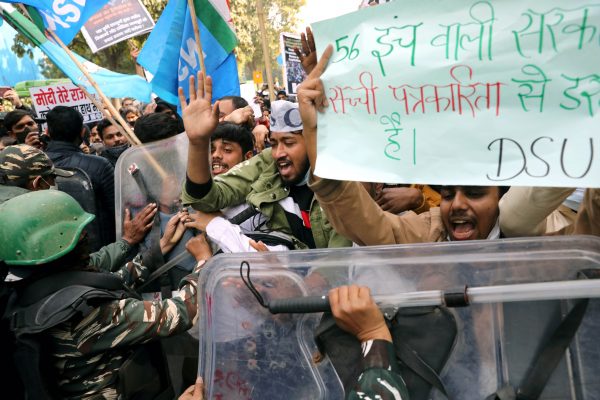The government responded to protests with a massive police blockade of the protest sites. This was followed with criminal charges against journalists and a shutdown of telecommunications, internet, water and electricity supply at protest sites.
One interesting, if unsurprising, target of the crackdown was the social media platform Twitter.
Pursuant to an unexplained ‘legal demand’, Twitter blocked nearly 250 accounts belonging to protestors and opposition leaders — including leading investigative journalism magazine Caravan India — without notice. This action, allegedly a government request, targeted accounts amplifying or covering the protests. The Twitter coverage was in contrast to India’s mainstream media, which vilified the protesters and is largely accused of being pro-establishment.
While the accounts are now restored, the events expose the power such platforms wield in contemporary democracies.
While Twitter can’t claim a spotless track record on content moderation in India, it isn’t the only platform to kowtow to government demands or turn a blind eye to hate speech from India’s ruling Bharatiya Janata Party (BJP).
In 2020, Facebook found itself in a political storm when its head of policy in India, Ankhi Das, was accused of fawning over Prime Minister Narendra Modi. Das made a series of internal posts showing support for the BJP and advised against moderating red-flagged content from government leaders fearing adverse business consequences for the company.
Big tech’s approach in India is a careful balancing act between its business interests, given India’s vast user base and potential, and the risks involved in antagonising the right-wing Hindu nationalist government.
Twitter’s recent actions in India stand in contrast to its stance in the United States where it banned former president Donald Trump’s account for inciting violence after flagging his tweets with warnings. This move was spun as the courageous act of holding authoritarian power to account with Twitter CEO Jack Dorsey proclaiming the ban the ‘right decision’ but lamenting the precedent it may set for a ‘free and global internet’.
India’s right-wing ecosystem quickly saw the threat of the same strict standards of content moderation to its frenzied discourse. Headed by lower house parliamentarian Anurag Thakur, India’s parliamentary committee on information technology summoned Facebook and Twitter representatives over concerns of ‘anti-conservative bias’, perhaps in an attempt to pre-empt any moderating action by the tech giants.
Thakur is the same politician who famously led an angry crowd chanting the slogan ‘shoot the traitors’ in reference to those protesting against India’s controversial Citizenship Amendment Act (CAA). Within days of Thakur’s speech, three instances of protestors being fired upon were reported. It is in the context of the same controversial citizenship law that the BJP was accused of running a deceptive Twitter campaign to display the support of the masses.
In the wake of Trump’s account ban, Dorsey expressed concerns about maintaining free speech while also warning of offline harm resulting from online speech. But this idealism must carry through to all democracies far and wide. Big tech social media platforms are often quick to disregard their principles in developing countries as they are bent to the will of governments intent on suppressing minorities and dissident voices.
It was only in the face of a wave of intense backlash against the ban that Twitter unblocked the affected Indian accounts, much to the chagrin of the government which is threatening penal action for non-compliance. In its statement, Twitter has since chosen to disagree with the Indian government on the legality of the blocking request. But it also noted in the same statement that it removed 500 accounts at the government’s request. This begs the question of where the platforms would seek refuge should the government seek to amend the law to further its interests — a process well underway.
Twitter’s flip-flop on the issue is scarcely laudable, just as its position in this situation is hardly enviable. Yet its responsibility flows from its business model. The consequences of inconsistent regulation by social media platforms — which have the power to make or break mass movements — cannot be overstated.
In banning Trump’s account, these platforms assumed the role of the custodian of online speech. They must now seek consistency in applying their claimed regulatory standards. Otherwise, they risk de-platforming the oppressed in favour of the oppressors and enabling state excess rather than accountability.
Charitarth Bharti is a lawyer and postgraduate student at the Lee Kuan Yew School of Public Policy, National University of Singapore.

